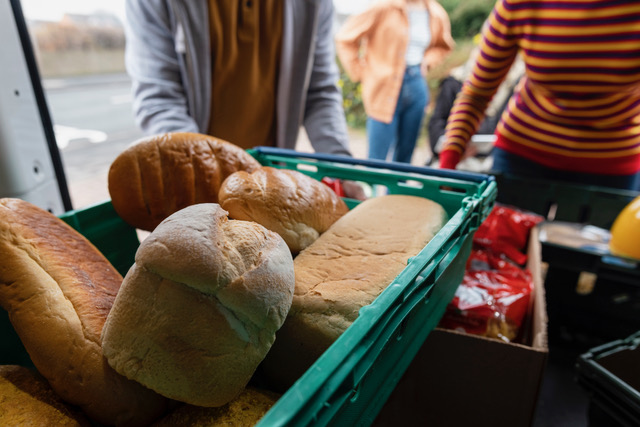A £15m fund has been created by the government to help charities involved in distributing produce and tackling poverty get spare food from farming to those in need.
The fund has been created by the Department for Environment, Food and Rural Affairs and aims to strengthen links between farms and charities.
An estimated 330,000 tonnes of edible food are either wasted or repurposed as animal feed “before leaving farm gates every year”, said the government department.
“While farmers would prefer for this to be destined for people’s plates, charities that redistribute food often lack the means to collect food from farms and get it to those who need it,” it added.
Grants starting from £20,000 will be made available to charities in England.
Food banks, food poverty charities and homeless shelters are among charities the funding is aimed at supporting.
It will also reduce costs for farmers in dealing with food waste.
“Nobody wants to see good food go to waste – especially farmers who work hard to put food on family tables across the country,” said circular economy minister Mary Creagh.
“Our new fund will help the charitable sector to work more closely with farmers, helping to find new opportunities to get their world-leading produce to those most in need within our communities.”
Charities involved in distributing food and tackling food waste have welcomed the funding.
In a joint statement Felix Project chief executive Charlotte Hill and FareShare CEO Kris Gibbon-Walsh said: “After years of campaigning by food redistribution charities, we are thrilled to see this fund come to fruition.
“We are pleased that the government has recognised that too much food goes to waste on our farms, and that it should be redistributed to feed people who need it.
They added: “We look forward to acting quickly with the government, the charity sector, and farmers to maximise the impact of this initiative during British growing season, ensuring surplus food reaches as many people as possible.
“We have a proven model which funds farmers to redistribute their unsold food, which means that together, we can take meaningful steps toward achieving a zero-waste Britain.”
Harriet Lamb, chief executive of environmental NGO WRAP said: “This is welcome support for farmers and redistribution organisations ensuring more quality food is rescued and can support more people and communities, while reducing the environmental impact of food waste on climate change.
“It gives a flying start to the New Year, ensuring that food charities and the farming sector can both make a difference immediately and can develop long term solutions. Every year, the amount of surplus food being redistributed is going up, but sadly the need is also increasing so this gives a much-needed boost.”
She added that in 2024, 191,000 tonnes of food from retailers, food manufacturers, the hospitality sector and UK farms - worth £764 million - was redistributed with the potential to make 450 million meals.
Information on when the fund opens and full eligibility criteria for applications will be confirmed in the New Year, added the government.
Latest News
-
Burnout fears emerge for younger charity workers
-
Youth charity to adopt co-leadership model
-
Mahnoor Khan: Lessons from my first year in the charity sector
-
Charities should deploy AI ‘around real user needs’ not ‘internal assumptions’, says report
-
Improved NHS mental health support prompts charity’s closure
-
Scramble to house 87 people following homelessness charity’s sudden closure
Charity Times video Q&A: In conversation with Hilda Hayo, CEO of Dementia UK
Charity Times editor, Lauren Weymouth, is joined by Dementia UK CEO, Hilda Hayo to discuss why the charity receives such high workplace satisfaction results, what a positive working culture looks like and the importance of lived experience among staff. The pair talk about challenges facing the charity, the impact felt by the pandemic and how it's striving to overcome obstacles and continue to be a highly impactful organisation for anybody affected by dementia.
Charity Times Awards 2023
Mitigating risk and reducing claims

The cost-of-living crisis is impacting charities in a number of ways, including the risks they take. Endsleigh Insurance’s* senior risk management consultant Scott Crichton joins Charity Times to discuss the ramifications of prioritising certain types of risk over others, the financial implications risk can have if not managed properly, and tips for charities to help manage those risks.
* Coming soon… Howden, the new name for Endsleigh.
* Coming soon… Howden, the new name for Endsleigh.
Better Society

© 2021 Perspective Publishing Privacy & Cookies














Recent Stories